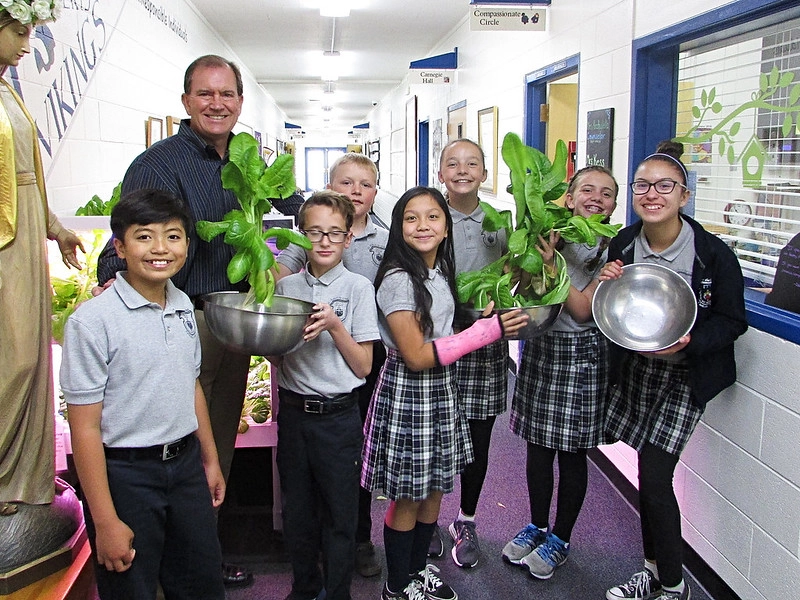작은 벌레가 야채 잎사귀 위를 기어가는 모습을 지켜보던 아이들의 눈에 호기심이 불타오르는 것을 본 적이 있나요? 아니면 자신들이 뿌린 씨앗이 흙을 뚫고 나올 때 아이들의 얼굴이 놀란 표정을 짓는 것을 본 적이 있나요?
이러한 순간은 어린이의 학습 욕구를 불러일으킬 뿐만 아니라 자연 세계와 직접적인 정서적 연결을 형성하고 있음을 보여줍니다.
이것이 바로 점점 더 많은 교육 기관에서 학생들이 자연의 경이로움과 위엄을 경험할 수 있도록 돕기 위해 학교 정원과 수경재배를 사용하고 있는 이유입니다.
학교 정원과 수경재배 프로젝트는 학생들에게 자연을 경험할 수 있는 실습 플랫폼을 제공하고 실제 활동을 통해 주변 생태 환경과 상호 작용하는 방법을 가르칩니다.
현재 수경법 STEM 프로그램은 전 세계 교육 기관에서 점점 인기를 얻고 있습니다. 교사들은 이러한 프로젝트 기반 학습이 학생들이 자연과 더 깊은 관계를 맺는 데 효과적으로 도움이 된다는 것을 발견했습니다.
수경재배가 STEM 교육에서 그토록 중요한 위치를 차지하는 이유는 무엇입니까?
수경재배가 STEM에 중요한 이유는 무엇입니까?
이제 수경재배가 무엇인지, 수경재배가 아이들과 자연을 어떻게 연결할 수 있는지 이해했으니 이제 STEM과의 관계를 살펴보겠습니다. 수경재배가 STEM 교육의 일부가 되어야 하는 세 가지 이유는 다음과 같습니다.
1. 실습 STEM 프로젝트로 학생들 교육
실습 학습은 학생들이 교육에 적극적으로 참여하고 학습에 흥미를 갖도록 하는 좋은 방법입니다. 학교 수경재배 프로그램은 STEM 및 기타 분야에서 적극적인 학습을 위한 수많은 기회를 제공합니다.
예를 들어, 수경 기술을 사용하면 식물이 통제된 환경에서 자랄 수 있으므로 식물학 및 환경 과학을 효과적으로 가르치기 위한 STEM 교육에서 점점 더 인기를 얻고 있습니다.
수경재배의 적용을 통해 학생들은 식물이 영양분을 어떻게 흡수하는지, 다양한 환경 요인이 식물 성장에 어떤 영향을 미치는지 적극적으로 탐구할 수 있습니다.
또한 물의 화학적 특성과 광합성(식물이 양분을 생산하는 과정)에서의 역할과 같은 다양한 STEM 개념을 가르치는 도구로도 사용됩니다.
학생들은 또한 빛의 물리적 특성과 빛이 식물 성장에 미치는 영향을 연구하는 동시에 실험실 수경 재배 시스템을 구축하고 유지 관리하는 데 필요한 공학적 원리를 이해할 수 있습니다. 교육에 수경재배를 적용할 수 있는 가능성은 무궁무진합니다.
교육적 이점 외에도 수경재배는 재미있는 학습 매체이자 학생들이 식물과 환경에 대해 배우도록 유도하는 방법이 될 수 있습니다. 자신의 손으로 식물을 재배함으로써 학생들은 자신의 행동이 주변 환경에 어떤 영향을 미치는지 시각적으로 확인할 수 있습니다.
학생들이 STEM 개념을 활용하여 수경 식물을 재배할 때 현대 사회에서 중요한 기술인 비판적 사고 능력과 팀워크 능력도 향상됩니다.

2. 수경재배는 식품 생산의 미래입니다
수경재배는 농업의 미래라고 불리는 데에는 그만한 이유가 있습니다. 전통적인 야외 정원 가꾸기에 비해 더 작은 공간에서 더 빠른 속도로 더 많은 식물을 재배할 수 있기 때문입니다.
또한 수경재배 기술은 토지와 수자원에 대한 의존도를 크게 줄여 자원 효율성을 향상시킵니다.
더욱 효율적이고 지속 가능한 농업 모델인 수경법은 수자원이 부족한 지역에서 특히 매력적입니다. 학교에 수경재배를 도입하면 학생들이 귀중한 STEM 기술을 습득하는 데 도움이 될 뿐만 아니라 식품 시스템과 지속 가능한 발전에 대한 더 깊은 이해를 촉진할 수 있습니다.
이러한 방식으로 젊은 세대는 과학, 기술, 공학, 수학에 대해 배울 수 있을 뿐만 아니라 환경적으로 책임 있는 태도를 배양하여 보다 친환경적이고 지속 가능한 미래를 만들기 위한 견고한 기반을 마련할 수 있습니다.
3. 학교 전체가 종합적인 수경재배 프로그램에 참여할 수 있습니다.
적응성으로 인해 학교 수경재배는 모든 학년에 통합될 수 있습니다. 올바른 지원, 자료, 커리큘럼을 통해 교사는 유치원부터 12학년까지 학생들을 위한 원활한 학습 경험을 만들 수 있습니다.
실습 STEM 프로젝트부터 식품 생산의 현재와 미래 이해에 이르기까지 학교 수경법은 학교 전체에 자연 세계의 마법과 그 속에서 우리가 차지하는 위치를 교육할 수 있는 STEM 교육의 중요한 부분입니다.
Discover Green Our Planet's Hydroponics STEM Program
건강하고 친환경적인 신선한 농산물을 재배하기 위한 효과적인 방법으로 수경재배를 장려하려는 노력이 전 세계적으로 이루어지고 있습니다.
교육 기관은 도서관, 지역 사회 단체, 식품 저장실과 협력하여 전문 지식을 더 많은 청중에게 제공할 수 있습니다. 예를 들어, Greenourplanet의 인디언 스프링스 도서관 프로그램은 큰 성공을 거두었습니다.
Greenourplanet 프로젝트의 가장 흥미로운 측면 중 하나는 학생들이 농부를 호스트할 수 있는 기회를 갖는다는 것입니다.’ 시장에서는 수경재배 시스템에서 재배한 과일과 채소를 판매합니다.
대규모 학생 농민’ 시장은 지속 가능하고 건강한 식품 공급원을 만들기 위한 노력과 헌신을 완벽하게 보여줍니다.
우리는 교육이 지속가능성 문화를 촉진하는 데 핵심이라고 믿습니다. 학교에 수경재배를 도입하고 STEM 교육을 새로운 수준으로 끌어올릴 준비가 되셨습니까?
제이스
AUXGROW의 디지털 마케팅 관리자인 Jayes는 수경 재배 시스템에 대한 열정과 LED 재배 조명에 대한 전문 지식을 결합합니다. 실무 경험과 깊은 이해를 바탕으로 Jayes는 지속 가능한 재배의 세계로 여러분을 안내합니다.






